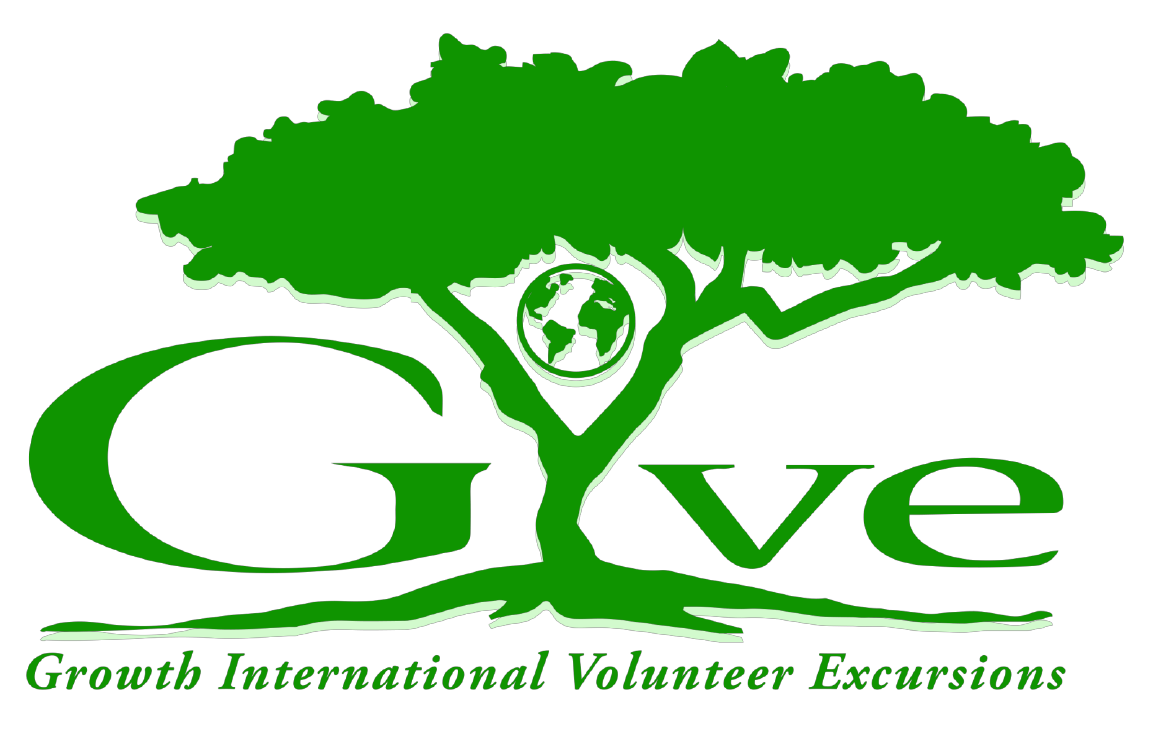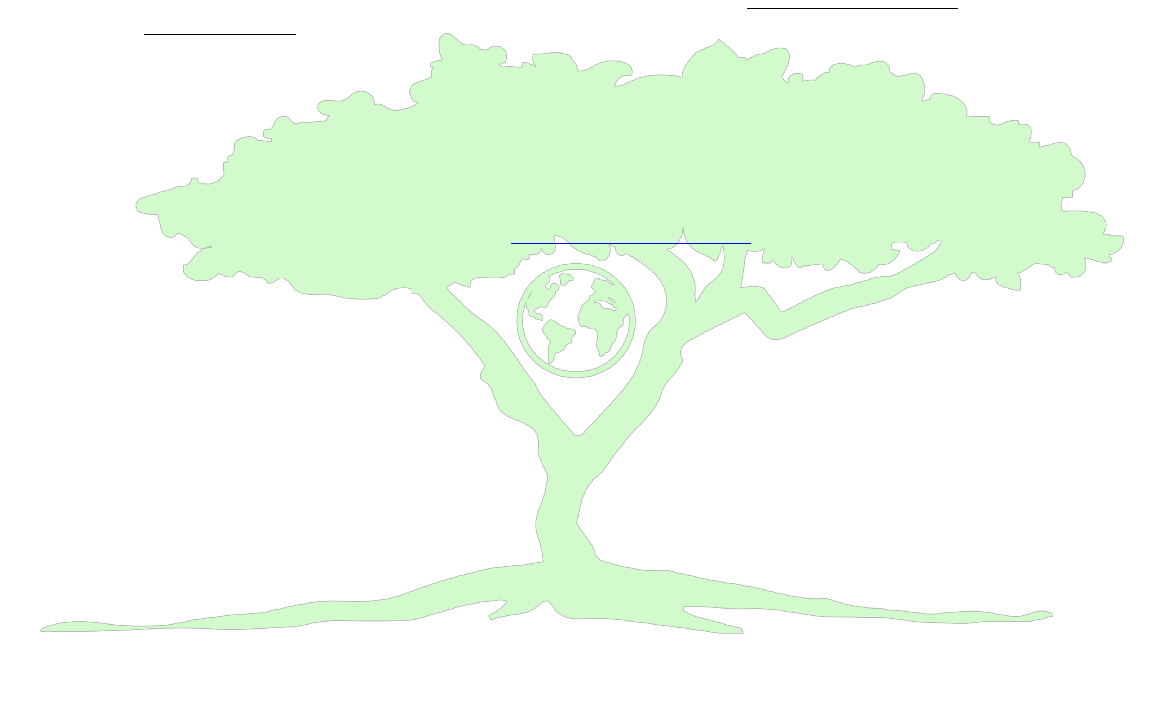
GIVE Trip Overview
Thailand Excursion
The Roots of Change
GIVE Excursion Overview
Get ready! Your GIVE Thailand Excursion is coming up soon, so prepare to be immersed
in the fascinating culture and environment of Northern Thailand, broaden your
perspectives of the world, and meet your new GIVE family. Your Thai journey will take
you from the historic Old Town of Chiang Mai to the rolling green landscapes and rustic

GIVE Excursion Overview - 2
hill-tribe villages of Mueang Khong. Here you will be directly involved in locally led
volunteer projects, authentic cultural experiences, and off-the-beaten-path adventures that
empower local people and preserve local ecosystems.
This Excursion Overview includes important information about your upcoming trip.
Some of this material may appear familiar, but please read the entire overview as some
information may have changed, and all of the information is important to making sure
your experience is as enjoyable as it can possibly be.
(packing list included – refer to page 18)
Preparation Reminders Prior to Departure
Passport:
Don’t forget to bring your passport and at least two color-copies of your passport to
Thailand. Our office should have already received a color copy of your passport, but it is
important that you bring color copies when traveling abroad as well.
Make sure that your passport is valid and does not expire within 6 months of your return
travel date. For example, if you return home on June 1, 2024, your passport expiration
date cannot be prior to December 2, 2024. Also make sure that your passport has at least
2 empty pages for entry/exit stamps.
If you have not yet ordered or received your passport, please contact us immediately
by phone at +1 (206) 973-7991 or email at [email protected].
Traveler’s Insurance (Required)
International Medical and Traveler’s Insurance (Required):
GIVE requires all travelers to provide proof of traveler’s insurance coverage. This
ensures that you have coverage if unforeseen events arise such as baggage loss, travel
delay, sickness, injury, etc.
For USA residents and Canadian Residents: you can purchase insurance from the GIVE
website under “Travel Details” in the navigation. You can find it directly at this link: go
to https://www.givevolunteers.org/prepping-trip/travel-details/#insurance
● Departure & Return Dates: Be sure to include all travel days (for example, if
you’re taking a red-eye home, the return date is the day you land back home)
● Trip Cost: This is the total amount that you are insuring, which should equal your
GIVE trip at a minimum.
o We strongly recommend covering both the cost of your flights and GIVE
trip. If you have not purchased flights yet, you can still purchase insurance
and either estimate cost of flights or increase your coverage later.

GIVE Excursion Overview - 3
Non-US Residents: You must provide proof of international travel insurance meeting
GIVE’s requirements and insuring your total trip cost (and flight, if preferred).
If you’d like to purchase from a different provider, then you must confirm you are aware
of our coverage requirements and that your policy meets those requirements. Note that
your insurance coverage must include trip cancellation and interruption.
Visa:
There are a few different options for visas, so read below. Depending on your citizenship,
you may be exempt from obtaining a visa, can receive one on arrival, or order prior to
departure.
1. Tourist Visa Exemption (if traveling in Thailand less than 30 days)
If you are a US citizen or a citizen of one of the countries listed below, you do
not need to obtain a visa as you fall into the Tourist Visa Exemption category. In
this case, you are required to:
1. Provide Proof of Onward Travel: bring proof of confirmed air, train,
bus, or boat tickets showing you will leave Thailand within 30 days
from your arrival date. If you cannot provide proof, you will have to
obtain a tourist visa (which is outlined below).
2. Provide Proof of Finances: Thailand requires travelers to have proof
of adequate finances for the duration of your stay when you enter into
the country, such as a traveler’s check or cash equivalent to 10,000
Baht (approx. $300 USD) per person and 20,000 Baht (approx. $600
USD) per family. A screenshot of your bank statement would be
sufficient.
3. You may need an address in Thailand and, if so, write “Eco Resort
Chiang Mai, 109 Bumrungrad Rd. Watkate, Muang Chiang
Mai 50000 Thailand”
Countries with the Tourist Visa Exemption:
Australia, Austria, Belgium, Brazil, Bahrain, Brunei, Canada, Denmark,
Finland, France, Germany, Greece, Hong Kong, Iceland, Indonesia,
Ireland, Israel, Italy, Japan, South Korea, Kuwait, Luxembourg, Malaysia,
Monaco, Netherlands, New Zealand, Norway, Peru, Philippines, Portugal,
Qatar, Singapore, Spain, South Africa, Sweden, Switzerland, Turkey,
United Arab Emirates, United Kingdom: United Kingdom of Great Britain
and Northern Ireland, United States of America, Vietnam
If you are not a citizen of one of the above countries, please check with your
local Consulate to find out if you need a Thailand tourist visa. You may also be
able to obtain a Visa On Arrival and the process of how to go about doing this is
explained below (but still check with your consulate!).

GIVE Excursion Overview - 4
2. Tourist E-Visa (if traveling for more than 30 days in Thailand)
If you are doing the Thailand + Elephants + Scuba + Laos Package, or Thailand +
Elephants + Scuba Package, you MUST apply for a Thailand Tourist E-Visa prior
to your trip. GIVE will email you detailed instructions on how to apply for
this visa if necessary.
3. Visa on Arrival (If you do not qualify for the Tourist Visa Exemption or the
Tourist E-Visa)
If you are not a citizen of the above listed counties that have a Tourist Visa
Exemption (see above), you may still be able to obtain a Visa on Arrival,
depending on your citizenship. A Visa on Arrival allows passport holders of the
countries listed below* to enter Thailand if they meet the following requirements:
1. The visit is strictly for tourism purposes.
2. You have a confirmed return ticket to show proof of a flight out of
Thailand within 30 or 15 days of entry, as appropriate. Open tickets do
not qualify. Traveling overland out of Thailand by train, bus, etc. to
Cambodia, Laos, Malaysia (including en route to Singapore),
Myanmar, etc. is not accepted as proof of exiting Thailand.
*Important Note: You may be asked to show your flight ticket on
entering Thailand. If you do not possess a flight ticket to show you will
be exiting Thailand within 30 or 15 days of entry you will be most
likely to be refused entry.
3. Checkpoints for ON ARRIVAL Visas are available at the Don Muang
International Airport in Bangkok, and Chiang Mai International
Airport in Chiang Mai
4. For a complete list of checkpoints and ON ARRIVAL countries visit:
http://www.mfa.go.th/main/en/services/123/15393-Visa-on-
Arrival.html
*Bhutan, China, Cyprus, Czech Republic, Estonia, Hungary, India,
Kazakhstan, Latvia, Liechtenstein, Lithuania, Maldives, Mauritius,
Oman, Poland, Russia, Saudi Arabia, Slovakia, Slovenia, Ukraine,
Uzbekistan, Ethiopia, Taiwan, Bulgaria, Andorra, Malta, Romania,
San Marino.
5. Provide Proof of Finances: you may also need proof that you have
funds of at least 20,000 THB per person during your stay in Thailand.
A fee of 1,000 THB is payable upon entry and is subject to change
without notice.
6. You may need to provide an in-country contact and, if so, use the
following:
1. Name: Samila Travel Co., Ltd
2. Address: 48/6 Moo 1, Chanong, Chana, Songkhla 90130,
Thailand

GIVE Excursion Overview - 5
3. Telephone: +66 96-362-3596
Vaccinations:
Since we are not medical professionals, GIVE is legally unable to provide you with a list
of recommended vaccinations for traveling in Thailand. Vaccinations and medical
precautions are your discretion with the recommendations of your doctor or travel clinic.
We recommend that you contact your doctor or visit an immunization clinic to discuss
vaccinations as soon as possible, as some vaccinations take time to take effect, or require
a course of multiple vaccinations. Inform your doctor that you are traveling to Thailand
and the activities you plan to participate in so they can provide proper guidance.
To learn about vaccination recommendations or to find a travel clinic near you, visit
Centers for Disease Control at http://wwwnc.cdc.gov/travel/destinations/list.htm.
Medications:
You are responsible for providing your own over the counter or prescription medications
throughout your trip. Please discuss any specific medical questions or concerns with your
doctor before your trip. If you have asthma (even mild), please do not forget to bring your
inhaler.
If any changes to your health occur, it is critical that you update your Traveler
Information in your GIVE Profile as soon as possible. You can login to your GIVE
Profile from our website at www.givevolunteers.org. If you make any changes within 15
to take medications on the trip, please bring the medication name and description to
provide to your guides when you arrive, if necessary.
Safety and General Health Concerns:
There is inherent risk involved with GIVE’s programs, but we maintain a culture of
comprehensive risk mitigation throughout our trips. We aim to minimize risk by
employing proactive safety measures and established emergency protocols. Our goal is to
facilitate a life-changing experience that is safe, fun, and impactful.
In large part, the international crime warnings surrounding travel in Thailand become an
issue when traveling alone or with one other person in unfamiliar large cities. Most of
your trip takes place in rural areas, where you will always be with a group of fellow
travelers and GIVE guides with training in Wilderness First Aid, Risk Management,
Emergency Response, Mental Health First Aid, and Outdoor Leadership.
This is a group trip, where each traveler will be following our planned itinerary
throughout the duration of their trip. Furthermore, we have forged strong relationships
with local leaders, community members and emergency services over the last decade.
Additionally, we take necessary precautions and are prepared with adequate resources,
such as medical supplies and routes to local hospitals or clinics. We are prepared with a
comprehensive risk management plan to respond to any incident(s).

GIVE Excursion Overview - 6
To protect your general health in Thailand, it is important that you take good care of your
body, and that you are physically prepared to participate in the GIVE Thailand Itinerary.
We work outdoors daily engaging in strenuous physical activities in a tropical
environment. This means that you must always be aware of your hydration, sun
protection, and nutrition. If you do become ill or need to seek medical attention, we can
arrange for you to visit a local clinic or nearby hospital to receive care.
Luggage:
We encourage you to pack as light as possible (see packing list on pg. 18) It is required
that you bring a travel backpack or duffle bag instead of a hard cover suitcase. Hard
cover or rolling suitcases are NOT suitable for the areas we’ll be traveling. Here’s
what we recommend:
• Your carry-on bag: ONE small backpack to use as your day pack for volunteer
work, hikes and to carry your smaller items throughout the day.
• Your checked bag: ONE travel backpack or duffle bag is recommended. NO
HARD COVER OR ROLLING SUITCASES.
Also, be sure to check with your airline for baggage requirements and fees. Please be
aware that if you plan on purchasing souvenirs, airline weight restrictions may incur extra
charges when you return home.
Important Note Regarding Valuables:
When packing your luggage do not put anything valuable in your checked bag. This
includes electronics, copies of your passport, expensive jewelry, medications, etc. It is
best to pack all valuables in your carry-on bag. Pack at least one change of clothes and a
small pack of toiletries in your carry-on bag in case your luggage is delayed. Put luggage
locks on your checked bag as a safety precaution.
Flights and Arrival in Thailand
Flights:
If you have not already, contact our flight agents at StudentUniverse to book your flight
itinerary to Chiang Mai Airport (CNX). You can find their contact information on our
website under the “Travel Details” section of our menu.
Before departure, check your flight departure and arrival online to ensure that your
flight information has not changed. If it has changed, contact GIVE immediately to
provide us with the updated flight information.
Your flight will land at the CNX Airport on the start date of your trip. Note: if you’re
traveling internationally, you may be traveling the day(s) before your excursion start date.
You need to be in Thailand on your trip start date.

GIVE Excursion Overview - 7
For your departure, you will depart on your trip end date. GIVE’s flight agents can
provide details regarding preferred itineraries.
GIVE group flight itineraries include routes and layovers through specific airports so that
you and other GIVE travelers departing from the same region can potentially meet each
other during your layover(s) or on the plane. You will be invited to join a group
WhatsApp chat prior to your trip, where you can coordinate with other travelers about
meeting up enroute to Thailand.
Arrival in Thailand:
You may receive an immigration form on the airplane to complete before entering
Thailand. If you don’t receive this form on the airplane, don’t worry. Most immigration
checkpoints are no longer requiring this form for international arrivals. If you do receive
the form, input the following information, and give the form to a customs agent upon
your arrival:
• Address in Thailand: Eco Resort Chiang Mai, 109 Bumrungrad Rd.Watkate,
Muang Chiang Mai 50000 Thailand
• Accommodation: check the box that says “Hotel”
• Purpose of Visit: check the box that says “Holiday”
After you exit the plane, you will enter the airport into the Arrivals Hall. This is where
you will go through Thailand immigration with your customs form. There are multiple
arrival desks, so line up with your passport in-hand and ready to show to the immigration
officer.
After you pass through customs, you will head over to baggage claim. Collect your
baggage here and exit into the arrival terminal, where your GIVE guide(s) will greet you
in a green GIVE shirt just outside the arrival gate doors! Do not exit the arrival
terminal until you have met your GIVE Guide. You will then be able to exchange your
money to Thai Baht or use an ATM. If you’d like assistance withdrawing Thai Baht
(exchange rate, how much to withdraw, etc.), your guides will be happy to help.
After the group collects their baggage and uses the ATM, you will take our transportation
to our accommodations in Chiang Mai about 20 minutes from the airport.
NOTE: If you have a separate ticket to BKK and then to CNX, you’ll go through
immigration at your first point of entry into Thailand. Then you’ll fly domestically your
Chiang Mai to meet your guides and group.
Airport Pickups:
If you don’t immediately see your GIVE after exiting the baggage claim area, be sure to
wait in the international arrivals hall until they arrive. You will receive an email a few
days before your trip start outlining how to contact your guides directly if you cannot find
them at the airport. Do not leave the arrivals terminal. Stay inside the airport, and
keep an eye out for your guides in a green GIVE shirt!

GIVE Excursion Overview - 8
Flight Delays or Cancellations:
When traveling, unforeseen events can occur and travel may not be exactly how you
planned. Just remember, it’s all part of the experience! If you experience flight delays,
cancelations, or other travel-related issues on your trip, don’t panic. You have several
resources to help get you rebooked and on the next flight.
We will email you a few days before you depart with a list of resources and FAQ’s
to help you navigate any travel-related issues. Please print this document and/or
save it to your phone to easily reference in the event of a travel-related issue.
In the event of flight cancellations, unexpected delays, or changes, here’s what to do:
1. Go straight to the gate agent at the airport. They will be the best resource to assist
you to rebook your flight. If you’re not yet at the airport, skip to step 2.
2. While waiting to speak to the gate agent or if you’re not at the airport, call your
booking agents or the airlines directly. If you booked through StudentUniverse,
the numbers are below for after-hours assistance. Our agents may have access to
alternative airlines not readily available to the gate agent at the airport.
StudentUniverse: +1-844-985-4117
*If there are other GIVE travelers with you, work together and choose one point
person to speak with the agent to rebook flights.
3. After your flight has been rebooked, e-mail your updated itinerary to GIVE.
Make sure to include the airline, number, arrival time, and names of other GIVE
travelers with you.
4. Your guides will make alternative arrangements for your pickup – note that
delayed flights may incur additional pickup fees.
5. If flight changes result in a layover of more than six hours or if you must pay
additional fees for your delay, contact your Travel Insurance provider. They can
assist you with alternate arrangements and explain how your insurance policy
applies in your circumstances. Make sure to keep all receipts for potential
reimbursements!
Talking to gate agents at the airport and calling your flight agents/the airlines are
the best resources to rebook your ticket.
Late Flight Arrival:
If your flight is cancelled or delayed and you are unable to arrive to Chiang Mai Airport
on your trip start date, don’t panic. Follow the above steps to contact your travel agent
and rebook your flights. Email your updated itinerary to GIVE at

GIVE Excursion Overview - 9
info@givevolunteers.org.
Note: In the case of a late arrival, you will be responsible for paying for
transportation to our accommodations to meet the group. Depending on the
circumstances, your Travelers Insurance may reimburse you for costs incurred because of
your flight delay or cancellation. Make sure to keep receipts for reimbursement claims.
It’s always a good idea to bring an extra change of clothes (ideally, culturally appropriate
clothing that covers your knees and shoulders), all medications, important documents,
and money IN YOUR CARRY-ON LUGGAGE in the case of a late arrival, lost luggage
or any other unforeseen circumstances. Our guides will help you to obtain clothing and
other necessities if your luggage is lost or delayed.
Lost or Delayed Baggage:
If your baggage does not arrive at the airport, don’t panic. Go to the lost luggage counter
to make a lost luggage claim. Please give the representative your guide’s name and phone
number to contact when your luggage arrives (you will receive an email with your
guide’s contact information prior to departure). Keep the copy of your lost luggage claim.
Depending on the circumstances, your Traveler’s Insurance may reimburse you for each
day that your bag is lost or delayed. Make sure to keep receipts for reimbursement
claims.
Donations
Donations towards our education projects can always be accepted through our
Students4Students campaign on our website, here:
https://www.givevolunteers.org/fundraiser/
We ask you to please avoid bringing physical donations from home and instead
donate to the Students4Students fundraiser above. We will use your donations to
purchase necessary project supplies directly from local shops and markets in Thailand to
help stimulate the local economy. If there are specific supplies that we can’t purchase in
Thailand, your guides will notify you well in advance in your WhatsApp group.
Money
Notify Your Bank Before Departure:
Prior to your departure, inform your bank that you are traveling to Thailand. This is
important so that your bank does not put a hold on your account for irregular transactions.
If your bank does put a hold on your account, you will not be able to access your money
and it could take days to be able to use your card or access money from your bank. It only
takes a quick phone call to your bank before you depart to inform them of your
destination and length of travel to eliminate any potential problems. It is also encouraged
to bring more than one debit/credit card (if available) just in case one does not work or is
lost/stolen.

GIVE Excursion Overview - 10
Currency and Exchange Rates:
The national currency in Thailand is the Thai Baht. The current exchange rate is $1 US
Dollar (USD) is equal to approximately 35 Thai Baht. We encourage you to look up
current exchange rates prior to your departure as rates do fluctuate.
You must use Thai Baht for any local purchases. If you do bring USDs to exchange, you
will have a better exchange rate with large bills. It is important to bring new and crisp
bills, as ripped or dirty bills will most likely not be accepted. Although uncommon, you
might be able to exchange money at your local bank before you depart for Thailand.
However, most banks do not carry Thai Baht and must order the currency. Even if you
bring Thai Baht, be prepared to withdraw cash from the ATM at the airport upon arrival
in Thailand if necessary.
It’s important to consider that you will only be able to withdraw funds from an ATM
while we are in Chiang Mai on days 1, 2, 13 and 14 of the trip, as the rural areas we will
travel to do not have ATMs. Therefore, you should carefully consider your spending
habits when withdrawing money so that you don’t run out of cash. Your GIVE guides
will remind you to use the ATM in the airport and other locations before we depart
Chiang Mai.
Money Recommendations During Your Excursion:
Since spending habits vary from person to person, please plan according to your own
personal habits! GIVE suggests planning to spend Thai currency equivalent to $200 to
$400 USD for purchasing souvenirs, gifts, snacks, drinks, etc. You can always ask your
GIVE guide for help translating and calculating exchange rates while shopping or
purchasing souvenirs.
All drinking water and three meals a day are included throughout your trip. Only dinner
will be provided on arrival day and only breakfast will be provided on departure
day, so plan accordingly. We also encourage you to experience buying local food and
drinks at local shops, restaurants, and markets, so expect to purchase some snacks, meals
and drinks for yourself when the opportunities arise.
Communication
Adapters & Electronics:
You will be able to charge your cameras and other electronic devices throughout most of
your time in Thailand. Thailand often takes either a flat blade plug, (like the US) or a two
round pin plug.
Note that our accommodations in the hill tribe villages often run on generators so
electricity will shut off occasionally. However, you will have sufficient time to charge
your electronics, and you will be notified of the times and places where electricity will

GIVE Excursion Overview - 11
not be available. Generally, there will be 3-4 nights throughout the trip with very limited
electricity as we explore more remote villages. We highly recommend bringing your own
rechargeable power bank.
Contacting Home:
An important aspect of any GIVE trip is to unplug from your devices and plug in to the
experience. We encourage our travelers to minimize use of phones, social media, and
contact with friends and family during the trip to get the most of your time in Thailand.
Much of your time will be spent in remote areas where there is limited to NO mobile
service or WIFI. Make sure to inform your family and friends to expect limited
communication from you during your trip. In the event of emergencies or case-by-case
circumstances, your guide will arrange for you to contact home if service is unavailable.
GIVE will also contact your emergency contact upon arrival to Thailand.
Home Contacting You:
For status updates, general questions, and emergencies your family can contact the GIVE
offices at +1 (206) 973-7991 or email [email protected] while you are on your
trip. Our GIVE HQ team will relay any important messages to you and your guides.
GIVE will occasionally post photos of the group on our social media channels during
your trip. Let your family and friends know to follow GIVE’s Facebook, Instagram, and
other social media channels (@givevolunteers) for updates.
Weather
Come prepared for hot weather throughout the day, sprinkled with short rain showers.
The sun is very powerful in this region, so it is important to pack adequate sun protection,
such as sunscreen, SPF shirts and/or hats. Please see our suggested packing list for
specific recommendations.
In northern Thailand, November through January are the cooler, dryer months, with
temperatures dipping as low as 40°F in the late night and early morning, and then heating
up again to the 80’s and 90’s throughout the day. Definitely pack some warmer clothes to
sleep in if you’re joining us in December or January!
March, April, and May are the hottest months, when temperatures can soar well over
100°F. There is a rainy season from May – September, characterized by sunny, humid
days intermixed with short, often heavy rain showers. Expect plenty of rain showers this
time of year (July and August especially), as the seasonal monsoons transform the Thai
highlands into a lush, green, tropical, and MUDDY, oasis.
Accommodations
There are 3 main types of accommodation throughout your trip:

GIVE Excursion Overview - 12
• Eco Resort Chiang Mai (Days 1, 2, 13 and 14): Air-conditioned rooms with
shared bathrooms in the city of Chiang Mai. You will share same-sex rooms with
1-3 other travelers. Eco Resort has an on-site restaurant, swimming pool and
meeting area.
• Ban Phu Tawan Resort (Days 3-10): Fan rooms with private bathrooms in our
host community of Mueang Khong. You will share same-sex rooms with up to 5
other travelers. Ban Phu Tawan has an on-site restaurant, meeting room and is
right next to a small river for swimming.
• Homestays in Remote Villages (Days 11 & 12): During the elephant trekking and
bamboo rafting portion of your journey, the entire group will share homestay
accommodations in our host communities of Ban Khao Lam and Pong Ngen. You
will share same-sex dorm rooms with up to 15 other travelers with access to
shared bathrooms. Everyone will sleep on floor mattresses with pillows, blankets,
and mosquito nets. Nestled in the heart of our host communities and surrounded
by nature, this is the perfect opportunity to get out of your comfort zone and
immerse yourself in the local culture and environment.
Our accommodations are comfortable and equipped with necessary amenities, such as
running water, toilets, showers, beds with sheets and blankets, etc. You will have access
to electricity for most of your trip, but brief power outages are common throughout your
trip, and you will be spending 3 days and 2 nights in more remote villages without access
to electricity at the end of your trip. Therefore, we highly recommend bringing your
own rechargeable power bank for charging phones and other small electronics.
You do not need to bring your own blankets or pillows, as they are provided for you, but
we highly recommend bringing a microfiber towel. For the duration of your trip, you
will share sleeping quarters and bathrooms with your fellow travelers, so practice the
golden rule! If you’d like to room with a friend, please let us know before your trip and
we will do our best to arrange that for you. Otherwise, your guides will provide room
assignments when you arrive in Thailand.
Please remember that you will be staying in rural communities in a tropical climate,
which means you will encounter different weather conditions and insects than you are
accustomed to at home. We will provide mosquito nets when necessary and will always
fully prepare/advise you on any necessary precautions to take. Please review the packing
list thoroughly to ensure that you’re prepared. Most importantly, arrive with an open
mind, positive attitude, and commitment to expand your comfort zone!
Meals
You will be provided with drinking water and 3 balanced nutritional meals per day
throughout your trip. Please note that, due to airport arrival and departure times, only
dinner will be provided on arrival day and only breakfast and lunch will be provided on
departure day. We can accommodate most dietary requirements, including vegans,
vegetarians, gluten free, etc.
Please make sure to inform us of any dietary requirements at least 14 days prior to
your trip. If you have not done so already, please inform us ASAP

GIVE Excursion Overview - 13
(info@givevolunteers.org). Adjustments to dietary requirements CANNOT be made
upon arrival, as meal plans have already been organized by local vendors.
Finally, remember that you are in a different country with different types of food than
you’re used to at home. Prepare to get out of your comfort zone a bit and sample lots of
delicious new cuisine. Most importantly, as a responsible traveler, be respectful of our
local chefs and the local food culture. Rice is the dietary staple of Thailand and will be
served with nearly every meal.
Volunteer Projects
Throughout your trip you will get to volunteer on locally led projects that promote
community development, wildlife conservation, and ecological restoration in our host
communities. We encourage you to try each project throughout your trip, as it will
enhance your overall experience and impact on the ground.
English Education Projects:
The schools in our host communities are filled with passionate teachers and enthusiastic
students. However, unlike most schools throughout Thailand, these rural schools do not
have access to native-speaking English teachers. Still, local students are expected to pass
standardized English exams to advance to secondary and tertiary education. Furthermore,
a growing number of employment opportunities are becoming dependent on strong
English language skills. In response, GIVE is working alongside local teachers to
supplement their English Education curriculum with lessons and conversation practice
with native English-speaking volunteers. As teaching assistants, our volunteers plan and
deliver lessons with the support of GIVE’s education coordinators and local teachers.
Farm to Cafeteria Projects:
Since the 1960's, rapid deforestation caused by commercial logging and agriculture has
affected the lives of everyone in Thailand, from Bangkok residents who have been
displaced by flooding, to farmers in rural areas who have seen their soil quality and crop
yields decrease due to drought and desertification. In our host communities of Mueang
Khong, there are a growing number of local farmers that want to regenerate their soil,
conserve natural resources, and increase crop yield. However, most of them are hesitant
to change their approach due to the economic risk of a failed season.
In response, GIVE is working alongside local experts, teachers, and students to create
demonstration farms at local schools, which produce a diverse variety of nutritious fruits,
vegetables, herbs, mushrooms, and livestock on relatively small plots of land. These
farms are living laboratories that empower students to grow their own delicious and
nutritious food throughout the school year, while also educating them on the importance
of protecting natural resources and farming in harmony with nature.
Reforestation & Asian Elephant Conservation

GIVE Excursion Overview - 14
Deforestation throughout Thailand has pushed many native species to the brink of
extinction, as their habitats have been clear-cut for commercial logging and monocrop
agriculture. The Asian Elephant, an iconic, symbolic and keystone species in Thailand,
stands at the frontlines of this battle. You will have the unique opportunity to interact
with these majestic creatures in their native habitat, while also helping to restore it
alongside Chiang Mai University’s Reforestation Unit. As you volunteer on projects
ranging from tree planting, seed collection, and tree nursery maintenance, remember that
you are directly contributing to the welfare and conservation of Asian elephants.
Adventure & Cultural Activities
Work hard, play hard is our motto. Lots of your time will be focused on our volunteer
projects, but you will also have plenty of opportunities to explore the culture, landscapes,
and wildlife of Northern Thailand!
Here is a list of activities you will have the chance to do while in Thailand:
• Exploring Chiang Mai markets & temples
• Muay Thai boxing lessons
• Shopping at local markets
• Volleyball, soccer, and other sports with local kids
• Traditional crafts lessons
• River Tubing
• Pad Thai cooking class
• Jungle trekking and caving
• Karaoke night!
• Exploring hill-tribe villages
• Bamboo rafting
• Elephant trekking
• 50-meter Bungee jump!
Itinerary (Sample)
This is a sample itinerary of GIVE’s Thailand Excursion, and, as such, will be modified
during your excursion. Traveling abroad requires flexibility based on weather, wellness
of the group, and other important factors. We appreciate your understanding and
adaptability with the itinerary.
Day 1:
Trip Start: Once your flight has landed, you will make your way through immigration and
baggage claim and then meet up with your guides and fellow travelers in the arrival hall.
From there we will drive 20-minutes to our accommodations in Chiang Mai, where you
will spend the first night getting to know the rest of your group and trying out some
delicious Thai cuisine.
Day 2:

GIVE Excursion Overview - 15
After breakfast, we’ll dive into the details of the journey ahead, learn more about Thai
culture and then take an introductory Thai language lesson.
In the afternoon, we’ll volunteer with Chiang Mai University’s Forest Restoration and
Research Unit (FORRU), helping with anything from tree planting, seed germination,
seedling potting & care, seed collection, weeding and fertilizing at one of their tree
nurseries or reforestation plots.
That evening, we’ll hop in tuk-tuk taxis to the Chiang Mai Night Bazaar to peruse endless
stalls of Thai street food, handicrafts & souvenirs.
Day 3:
After breakfast, we’ll head to a Buddhist temple to learn about the history of Chiang Mai
and the Lanna Kingdom, the basic principles of Buddhism, and how it all integrates into
Thai culture.
From there we’ll drive 3 hours north through the mountains and jungle of Chiang Dao
National Park towards our home for the next week – the hill-tribe villages of Mueang
Khong. After settling into your bungalows, we’ll head out on a tour of the surrounding
community and then gather to learn more about our volunteer projects!
Days 4 - 10 (typical day’s schedule):
Start your day with a Muay Thai boxing lesson or misty morning yoga (or sleep in). After
breakfast, we will volunteer on our English education or Farm to Cafeteria projects from
around ~8:30 - 11:30 AM. After lunch, we will have a bit of free time to relax and digest
before returning to the project site for the rest of the afternoon.
In the early evening, we will wrap up volunteer work and head out on one of our daily
excursions, such as exploring limestone caves, Thai cooking lessons, playing sports with
local kids, learning to make traditional handicrafts, or just relaxing by the river.
We will have dinner around 6:30 PM and then the evening is free to join nightly dialogue
circles, play games and music, or hang out around the bonfire.
Day 11:
First thing in the morning, we’ll travel to the Karen hill-tribe village of Ban Kao Lam,
which is home to several semi-wild elephants and their mahouts (elephant caretakers).
After exploring the community, we’ll learn how to build bamboo rafts with our local
guides and then gather for a discussion on elephant welfare and conservation in Asia!
Day 12:
Follow local mahouts (elephant caretakers) into the jungle at dawn to track elephants in
their natural habitat and feed them nutritious herbal supplements.

GIVE Excursion Overview - 16
That afternoon we’ll bamboo raft down the Mae Tang River to the Lahu hill-tribe village
of Pong Ngen. Here we’ll celebrate our final night in the jungle, sharing a delicious
dinner with our hosts and learning traditional dances around the bonfire!
Day 13:
Our bamboo-rafting journey culminates with the fastest rapids and best views yet! Strap
in and enjoy the ride or grab a bamboo pole and steer us towards our final adventure in
Thailand… a 160-foot BUNGEE JUMP! (Or drift karts if heights aren’t your thing).
After that it’s back to Chiang Mai for one final night of reflection and celebration.
Day 14:
All good things must come to an end. Soak up your last few hours in Thailand before
heading home or onwards to the next phase of your journey in Southeast Asia!
Packing for Your Trip
People tend to over pack while traveling and we suggest that you challenge yourself to
only pack the bare necessities. Our best suggestion is to lay out what you think you need,
and only bring three-fourths of that. You will realize that you need a lot less than you
think once you’re on the ground and there are opportunities to do laundry throughout
your trip.
In accordance with the cultural considerations of the communities we will be
visiting, you will be required to wear culturally appropriate clothing throughout
most of the trip. While teaching at local schools, exploring temples, or walking through
our host communities, you will need to wear culturally appropriate clothing. By
following these local standards, you are displaying cultural awareness and respect to our
host communities:
• Females will be asked to cover their knees, shoulders, and cleavage, and to not
wear any low cut, tight-fitting, or see-through clothing at these times. We
recommend packing at least 4 culturally appropriate outfits, which you can wear
multiple times.
• Males should bring at least 2 outfits that cover their shoulders and knees as well.
Expect to wear the same clothes multiple times for our reforestation and Farm to
Cafeteria projects, as they will inevitably get dirty. Also keep in mind that many of the
clothes you wear while working and exploring will become very muddy, so don’t expect
them to remain spotless when you return home.
*If you are also doing the Elephant Experience, Thailand Scuba, and/or Laos Excursion,
keep in mind that those packing lists have many of the same items listed here. Plan to re-
wear a lot of the same clothing, as there will be several opportunities for you to do
laundry.

GIVE Excursion Overview - 17
*If you are doing the Elephant Experience, we highly recommend bringing a smaller
backpack or duffle that can fit approximately 6 days of clothing and gear for days 2-7
of the itinerary. This way you can leave your big bag at our hotel in Chiang Mai and
travel light into more remote communities.
Packing Checklist of Recommended Items:
Please keep in mind that this checklist is based off the best possible recommendations
from our guides and past travelers, but at the end of the day it is up to you to bring what
you think you will need throughout your trip. We have not suggested a specific number
of t-shirts, shorts, pants/leggings, underwear, or socks, because individual preferences
often vary. Please review the itinerary to get an understanding of how often you will use
each article of clothing, and note that laundry services are available on days 1-8 of
your trip, and again when we return to Chiang Mai on day 13.
Item
Notes
Required
Optional
General Clothing
1 Lightweight raincoat/poncho
May – August is the rainy season in Thailand, but
showers should be expected year-round.
x
1 Sweatshirt, lightweight jacket or
sweater
December and January can get quite cold in the
mornings/nights so make sure to bring a jacket that will
keep you warm enough if you are on a winter trip
x
T-shirts
For females:
• When out in public: shirts must be loose-fitting
and tight around the neck. Cropped tops,
spaghetti strap shirts, mid-riff showing shirts,
and tank tops are NOT acceptable to wear in
public throughout the trip.
• At accommodations: Tank tops are OK to wear
at accommodations but should not reveal
cleavage. Sports bras are not acceptable to wear
in lieu of a shirt.
Shirts worn during projects and adventure activities will
get dirty, so pack enough to last the entire trip or plan to
do laundry during the trip.
x
SPF shirt(s)
We highly recommend at least one SPF shirt for sun
protection.
x
Shorts
Loose-fitting athletic shorts and hiking shorts are ideal.
‘Short-shorts’ or spandex shorts are NOT acceptable
to wear at any point throughout the trip
Shorts can be worn on reforestation & school garden
projects, while trekking, and while hanging out at the
accommodations for both males and females.
x
Pants/Leggings
For females, leggings are okay for most occasions,
EXCEPT while teaching and while out in public in our
host communities. For teaching and going out in public,
lightweight pants, knee length shorts, or knee length
x

GIVE Excursion Overview - 18
skirts are ideal (elephant pants work great and are very
affordable in Chiang Mai!).
Long, lightweight pants or workout capris made with
breathable and durable fabrics are ideal, such as soft-
shell hiking pants. These are great for working on
projects, caving and hiking with elephants.
Underwear and socks
Keep in mind that socks can get wet and dirty, so pack a
couple extra pairs.
x
1 swimsuit
Females can only wear swimsuits at our hotel swimming
pool in Chiang Mai. When we are outside of Chiang
Mai, females will be asked to wear a t-shirt and
shorts over their swimsuits.
x
Sunglasses
x
Hat for sun protection
x
Sport or athletic bras
x
1 pair of work gloves
We can provide basic work gloves when necessary, but
bring your own if you have a pair that you prefer.
x
Warm pajamas or sleeping clothes
It gets down to 40°F at night in December & January
x
1-2 “nice” outfits for special occasions
and nights out
At least one of these outfits must be culturally
appropriate
x
Footwear
1 pair of flip flops or sandals
It’s impolite to wear shoes inside people’s homes,
temples, and some businesses, so a durable pair of
sandals will make it easy to slip on and off, and will be
worn for the majority of the trip
x
1 pair of closed-toed boots or shoes
for volunteer projects and hiking.
Closed-toed shoes are required for projects and
hiking. Keep in mind that these will get wet &
dirty. It’s fine to use the same pair for both activities,
or feel free to bring an extra pair if you prefer.
Strapped sandals such as Tevas and Chacos are
not sufficient for certain hikes. Bring your closed-
toed shoes with the best traction for muddy trails
and project sites.
X
Other Gear
Small day pack or overnight backpack
Waterproof/water resistant if possible
This is what you will bring to the school, worksites,
overnight trips to neighboring villages and during
bamboo rafting (each raft has a bamboo tripod for
hanging bags to keep them dry).
x
Rain cover for your daypack or big
pack in case of rain during travel
Highly recommended
x
Small dry-bag for bamboo rafting
GIVE provides a shared waterproof dry bag for
valuables during bamboo rafting, but it is highly
encouraged to bring your own
x
Towel
You must bring your own towel. We recommend a
microfiber towel for easy packing and quick drying.
x

GIVE Excursion Overview - 19
Toiletries
Shampoo/conditioner, face wash/wipes, toothbrush and
toothpaste, soap, etc
x
Sunscreen
30 spf or higher. “Reef friendly” mineral sunscreens are
highly recommended!
x
Insect Repellent
Expect to use this every day – especially in July &
August. Natural and non-toxic insect repellent highly
recommended!
x
Anti-itch cream/wipes
x
Hand sanitizer/hand wipes
x
Refillable water bottle
REQUIRED
x
Reusable coffee cup and straw
To minimize plastic waste
Great if you plan on buying coffee or drinks
x
Large Ziploc Baggies/Waterproof bag
These are good to protect cameras and valuables from
getting wet, especially during bamboo rafting
x
Headlamp and batteries
REQUIRED for caving and recommended for late
night bathroom trips. Handheld flashlights are not
sufficient
x
Rechargeable portable battery
For charging phones and small electronics in villages
without electricity. Highly recommended.
x
Phone or a watch with an alarm clock
x
Headphones/Earplugs
Roosters roam around and can be quite loud while we
sleep in the villages!
x
Small first aid kit
x
1 good book
x
Camera
x
Vitamins
Multi-vitamins, vitamin C, Airborne, Emergen-C, etc.
x
Prescribed medications
You are responsible for bringing and taking any
medication prescribed by a medical professional.
x
Face Mask
At least two face masks for travel and when community
vendors request it.
COVID-19 Rapid Self-Test
We recommend bringing your own at-home test.
Travel/airplanes can cause people to feel stuffy or
exhibit cold-like symptoms. This test is recommended
so you can confirm if your illness if COVID-related
Over-the-counter medications
Over-the-counter fever reducers, gastrointestinal
medications, anti-inflammatories, electrolyte packets,
motion sickness medication, etc.
x
English/Thai dictionary
x
Deck of cards or other games
For hanging out during free time
x
Notebook with pens and pencils to
write about your excursions
x
Snacks
Local snacks are tasty, affordable and help to support
the local economy, but feel free to bring some of your
favorites from home.
x
Outlet converter/adapter
x
Camping Hammock
Great way to relax during downtime
x
Please give us a call at HQ with any specific packing related questions that you have.

GIVE Excursion Overview - 20
Spending Money: Thai Baht is necessary to purchase snacks, souvenirs, etc. in Thailand.
□ $200-$400 (equivalent in USD) spending money for souvenirs, snacks, and other
opportunities. We will have very limited access to ATMs throughout the trip, and 1 day to
exchange and/or withdraw funds in Chiang Mai at the beginning of the trip.
IMPORTANT! Don’t forget to pack your passport!!!
□ Passport
□ Two color copies of your passport
Culture Shock
Culture shock is a strange feeling many of us will face when we are traveling in a country
that is culturally different from our own. Knowledge about symptoms of culture shock
can help us identify and work through the shock as we continue to be involved with the
community and culture. Below is a list of symptoms of culture shock that you may
experience while traveling in a different country. Do not be worried about culture shock
as it is a normal part of the travel process, and completely expected to happen to just
about everyone. If you experience culture shock, your guides will assist you to work
through your feelings and experience, so don’t be embarrassed or afraid to say anything
to them. We have all been through it, so don’t think you’re the only one to feel this way!
You’re not alone!
Symptoms:
• Preoccupation with health
• Trying too hard to absorb everything in the new culture or country
• Insomnia, desire to sleep too much or too little
• Changes in temperament, depression
• Developing stereotypes about the new culture
• Feeling vulnerable, feeling powerless
• Irritability, resentment, unwillingness to interact with others
• Identifying with the old culture or idealizing the old country
• Loss of identity
• Melancholy, loneliness, sadness
• Lack of confidence and feelings of insecurity
• Developing obsessions with over-cleanliness
• Longing for family
• Feelings of being lost and overlooked
If you experience any of the above, please reach out to your GIVE guides as they will
provide you with support. Your guides will help you decipher your feelings and cope
with these symptoms, making the adjustment to this new land and new culture easier on
your mind, and a lot less stressful on your body.
While on Your Excursion

GIVE Excursion Overview - 21
Do not hesitate to let your GIVE guides know what you need while on your excursion.
We are here for you! We want you to work hard and enjoy this experience to the fullest,
so make sure if there is something preventing you from enjoying yourself entirely to let
your guides know so they can help you through it.
GIVE Contact Information
Phone USA +1 (206) 973-7991
E-mail info@givevolutneers.org
Skype info.give
Mail 1900 W Nickerson St. STE 116, #123
Seattle, Washington 98119 USA
Please contact us if you have any questions or concerns. Thank you and we are excited to
see you in Thailand!
